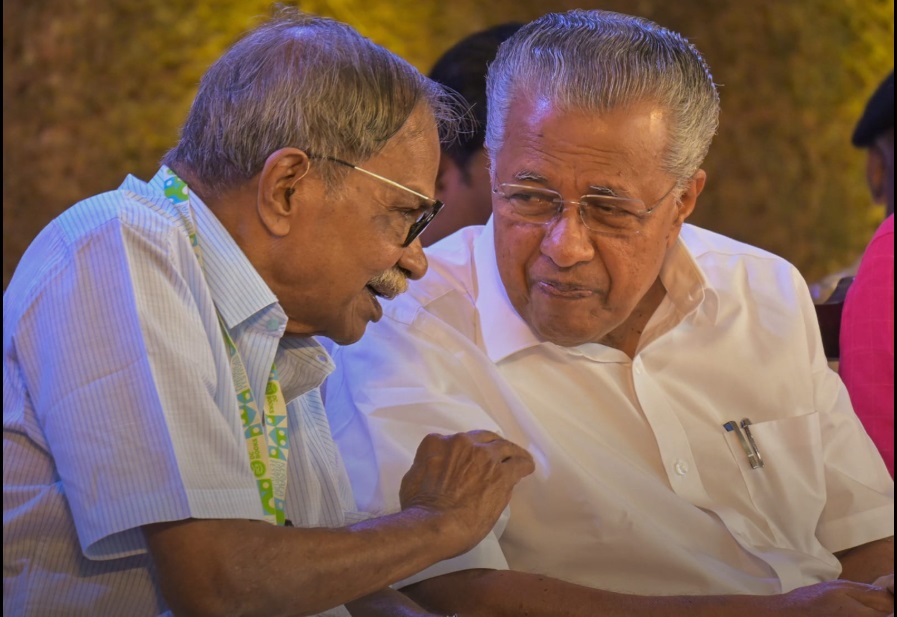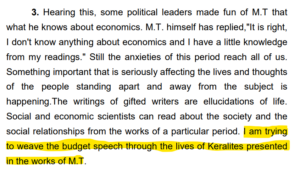Published Dec 27, 2024 | 3:00 PM ⚊ Updated Dec 27, 2024 | 3:00 PM

MT and CM Pinarayi Vijayan during KLF in January.
MT Vasudevan Nair, who passed away on Wednesday, 25 December, believed in the power of the word. A name synonymous with brilliance across creative realms, the maestro is revered as a journalist, short-story writer, novelist, screenwriter, director, and essayist.
Yet, an aspect of MT’s legacy that remains relatively unexplored — or ignored — is his role as a political commentator. Though he had made political statements through his works, both literary and cinematic, the master storyteller had at times voiced his views on politics in public.
Perhaps, it may come as an enigma, which MT was to many. A man who found peace in silence, where he conversed with his characters or the characters conversed through him in quietness, MT’s occasional forays into political analysis have been as impactful and thought-provoking as his literary masterpieces.
Two such instances stand out, sparking widespread debates and showcasing his sharp political acumen.
The first, a recent one, was a speech he delivered in January 2024 at the Kerala Literature Festival. His remarks against ritualistic worship of those in power stirred a political hornet’s nest, igniting intense discussions across political and intellectual circles.
The second, a bit old, came in 2016. It was his subtle but scathing critique of demonetization, which also raked up a controversy. The then-Left government threw its weight behind MT.
Those were rare yet powerful moments, as one of Kerala’s most celebrated cultural icons unravelled his political stance and wielded words as a tool to question and provoke.
The seventh edition of the Kerala Literature Festival held in January witnessed a momentous keynote address by the late Jnanpith laureate MT Vasudevan Nair.
With Kerala Chief Minister Pinarayi Vijayan and other dignitaries on the dias, the revered writer-filmmaker delivered a speech that touched upon themes of totalitarianism, personality cults, and the pitfalls of ritualistic worship of political leaders.
While MT refrained from naming any leader, his words sparked a political firestorm, with various political factions and cultural figures interpreting the remarks in their own light.
In that speech, MT invoked the legacy of iconic communist leader EMS Namboodiripad, praising his aversion to leadership cults and his rejection of personality worship.
Reflecting on the societal flux regarding freedom and progress, he remarked: “Time will evict people who continue to hold on to dogmas from the past… EMS strived to change the thought that one person should lead and others be led. A leader ceases to be someone ordained and turns into a historical necessity. EMS was such a leader.”
He also cautioned against authoritarianism, referencing Anton Chekhov and Maxim Gorky to underscore that freedom must be earned by the people themselves rather than being perceived as a favour from rulers.
Ending his speech, MT expressed hope that those in power would introspect and act in accordance with the needs of the time.
The speech was widely construed as a veiled critique of Chief Minister Vijayan, though it also drew parallels to Prime Minister Narendra Modi’s leadership style.
Senior Congress leader Ramesh Chennithala termed it a scathing critique of both the state and central governments. While Leader of the Opposition VD Satheesan stated that MT’s remarks were a warning against authoritarianism and the dangers of leaders exploiting democracy for centralising power.
BJP state president K Surendran asserted that MT aimed his critique squarely at Vijayan, reflecting public dissatisfaction with the adulation surrounding the chief minister within the CPI(M).
However, Left Democratic Front (LDF) convener EP Jayarajan countered that MT was targeting Modi, not Vijayan.
The CPI(M)-backed Desabhimani newspaper dismissed the controversy, stating that MT’s speech echoed sentiments he had expressed in a 2003 article.
The speech resonated deeply in Kerala’s literary and cultural circles.
While writer Sara Joseph described it as Kerala’s “collective sigh of relief” against the centralisation of power, poet K Satchidanandan interpreted it as a moral message transcending individual leaders.
Writer Paul Zachariah highlighted its relevance amid rising hero worship in society. However, writer Asokan Charuvil criticised the media for allegedly quoting MT out of context to malign Vijayan.
Even as interpretations took center stage, MT’s words had the shades of the oracle in Nirmalyam, the 1973 movie by the maestro. Towards the end of the movie, the oracle, portrayed by PJ Antony, is seen dancing before the goddess, spitting blood on the idol, and hitting his head with the sacred sword.
Amid mounting controversy, MT clarified. Through a Facebook post by writer NE Sudheer, who visited him at his home, he stated, “I didn’t criticise anyone. I only wanted to talk about the present reality. If my words have influenced anyone for self-criticism, I think that’s a good impact,” Sudheer quoted MT.
Sudheer also noted that MT had prepared the speech in advance and was surprised by the political uproar.
The controversy escalated when allegations emerged that the Kerala Home Department had conducted a secret probe to ascertain whether MT’s speech was “prompted” or externally influenced.
The subsequent police investigation concluded that there was no such influence, citing an earlier article by MT as the source of the speech’s ideas.
Despite this clarification, the political fallout persisted.
Former CPI(M) minister G Sudhakaran obliquely admitted that MT’s remarks targeted Vijayan but added that the party did not require lessons in Marxism from the writer. He invoked the EMS dictum of “rule and struggle,” emphasizing the Left’s historical stance on people’s issues.
His address at the Kerala Literature Festival became a significant political moment of the year as his critique of personality cults and totalitarian tendencies sparked widespread debate, drawing attention to the enduring relevance of his words.
In the wake of his passing, many continue to revisit his speech, underscoring its resonance in a time of deep political polarisation.
In December 2016, MT sparked a political storm when he criticised the Union Government’s demonetisation drive.
During the release of the book “Kallappana Vetta—Midhyayum Yadharthyavum” (Hunt against Black Money – Myths and Realities) authored by then Kerala Finance Minister TM Thomas Isaac, MT drew a parallel between demonetisation and the eccentric reforms of 14th-century Sultan Mohammed bin Tughlaq.
Speaking at the event in Malappuram, MT noted, “Tughlaq had shifted his capital not because of his crankiness alone, but also when the voice of dissent from people reached his palace.”
He went on to argue that countries that had attempted demonetisation faced crises, highlighting its devastating impact on ordinary citizens.
MT’s remarks drew sharp criticism from the BJP.
State general secretary AN Radhakrishnan questioned MT’s expertise on the issue, stating, “MT Vasudevan Nair is not an economist to criticise the demonetisation drive. We can understand if writers like A Sethumadhavan or KL Mohana Varma, who have a background in economics, make such comments.”
Radhakrishnan also accused the writer of selective silence on other political issues, including the murder of Revolutionary Marxist Party (RMP) leader T P Chandrasekharan.
“I don’t understand why he made such a comment and for whom is he speaking now from Thunchan Parambu. The people of the state would also like to know his views on the underdevelopment in Kerala,” Radhakrishnan said.
However, then BJP state president Kummanom Rajasekharan attempted to downplay the controversy, stating that everyone had the right to express their opinions, including MT. He maintained that the party’s leaders were merely responding to the writer’s criticism with their views.
In March 2017, the Left Democratic Front (LDF) government led by Chief Minister Pinarayi Vijayan uniquely came to MT’s defense.
Presenting the state budget 2017-18, Finance Minister TM Thomas Isaac lavishly incorporated MT Vasudevan Nair’s works and his criticisms of demonetisation into his speech, weaving the proposals with references to the legendary writer’s novels and characters.

An excerpt from the 2017-18 State Budget
Isaac began his budget speech with MT’s comparison of demonetisation to Tughlaq’s reforms, calling it a “man-made disaster” that had worsened the financial woes of the state.
“Presenting an annual budget during the times of demonetisation is a real challenge,” Isaac said, before elaborating on the social and economic disruptions caused by the move.
In the third para of that budget, Isaac further made his intentions clear: “I am trying to weave the budget speech through the lives of Keralites presented in the works of MT.”
The finance minister quoted extensively from MT’s novels, such as Nalukettu, to draw parallels between the policies of the central government and the challenges faced by Kerala.
In one part of the speech, he compared the central government’s economic policies to the obstinacy of the karanavar (patriarch) in MT’s novel, who locked the granary and refused to provide rice to the family.
“Like the karanavar of an old tharavadu, the central government has locked the granary. As described by MT in his novel Nalukettu, ‘Valiyamama’ said again, ‘Not even a single grain of rice will be given…Let me see if you will learn a lesson or not.’ This policy is the main reason for the present ration crisis,” Isaac remarked.
The speech also celebrated MT’s contributions to literature, culture, and Kerala’s socio-political history.
Isaac highlighted how MT’s works vividly chronicled the transformative reforms in Kerala’s history, from land reforms to the decline of feudal hierarchies.
“Recall the proclamation of Appunni in the famous novel Nalukettu: ‘will grow…will mature and live without fearing anyone. I am Appunni, the son of Konthunni Nair.’ It is a challenge to the feudal hierarchy. Such countless challenges altered Kerala,” Isaac said, weaving these references into the narrative of the budget and its vision for development.
Isaac’s 2017 budget speech became a fitting tribute to one of Kerala’s most beloved writers, blending literature and politics to underscore the state government’s support for MT amidst the backlash he faced.
By quoting extensively from MT’s novels and aligning the writer’s social critiques with Kerala’s development goals, the finance minister not only defended the writer but also made a strong political statement against demonetisation.
Despite the criticisms against MT that he is apolitical, an interesting observation was made by writer and critic MN Karassery while releasing the book MT: Experience, Interview, Investigation, published by Mathrubhumi Books in July.
“MT Vasudevan Nair’s works may not parade overt politics, but they resonate with subtle, profound political undertones. Critics have long accused MT of being apolitical—pointing out the absence of revolutionary workers or protagonists championing the cause of the working class. But MT’s activism lies not on the streets but in the quiet power of his writing. The paper in which he writes is his battleground,” Karassery observed.
He also shared a personal revelation: “It was MT’s travelogue about Germany that awakened in me a deep-seated opposition to Hitler—a testament to the transformative political undercurrent of his storytelling.”
MT Vasudevan Nair’s legacy, while deeply rooted in literature and art, transcends boundaries to offer powerful reflections on society and politics.
His words—whether woven into stories, essays, or rare public speeches—have consistently resonated with the pulse of the times, and will continue to provoke thought and inspire action.
(Edited by Majnu Babu).

